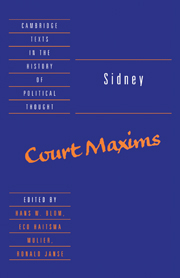Book contents
- Frontmatter
- Contents
- Preface
- Note on the text
- Introduction
- Principal events in Sidney's life
- Bibliographical note
- Biographical notes
- Court Maxims
- First Dialogue
- Second Dialogue
- Third Dialogue
- Fourth Dialogue
- Fifth Dialogue
- Sixth Dialogue
- Seventh Dialogue
- Eighth Dialogue
- Ninth Dialogue
- Tenth Dialogue
- Eleventh Dialogue
- Twelfth Dialogue
- Thirteenth Dialogue
- Fourteenth Dialogue
- Fifteenth Dialogue
- Index of biblical quotations
- Index of proper names
- Index of subjects
- Cambridge Texts in the History of Political Thought
Seventh Dialogue
Published online by Cambridge University Press: 05 June 2012
- Frontmatter
- Contents
- Preface
- Note on the text
- Introduction
- Principal events in Sidney's life
- Bibliographical note
- Biographical notes
- Court Maxims
- First Dialogue
- Second Dialogue
- Third Dialogue
- Fourth Dialogue
- Fifth Dialogue
- Sixth Dialogue
- Seventh Dialogue
- Eighth Dialogue
- Ninth Dialogue
- Tenth Dialogue
- Eleventh Dialogue
- Twelfth Dialogue
- Thirteenth Dialogue
- Fourteenth Dialogue
- Fifteenth Dialogue
- Index of biblical quotations
- Index of proper names
- Index of subjects
- Cambridge Texts in the History of Political Thought
Summary
Sixth Court Maxim: No man is to be employed that will not wholly depend upon the will of the king
Philalethes: all things natural and civil, the universe and all individuals in it, subsist by order, which broken, dissolution follows. The physical order in a man is the right disposition of parts and mixture of elements, which *if* a little discomposed he is troubled, if much, he certainly dies. The rational order of man is when the superior part has dominion over the inferior, the mind governs the body, the understanding rules the will and passions. Small transgressions of this order, deviations from reason, we call folly or error, but extreme habitual *transgressions* deserve the name of madness. Nature teaches us that he who is the head of a family is to be obeyed, else the order is broken and the family dissolved. The disobedient son in Moses' law was therefore to be stoned. A family is the union of several men into one body to live together. The two greater assemblies are in armies to make war, or in civil societies to preserve peace. Exact order is required in both: subjection and obedience in the inferior to the superior. This is so punctually observed in military discipline that the least prevarication is death, and no merit can preserve the offender. Manlius Torquatus put his son to death, having contrary to order fought with a valiant Latin that challenged him and slain him.
- Type
- Chapter
- Information
- Sidney: Court Maxims , pp. 81 - 86Publisher: Cambridge University PressPrint publication year: 1996



